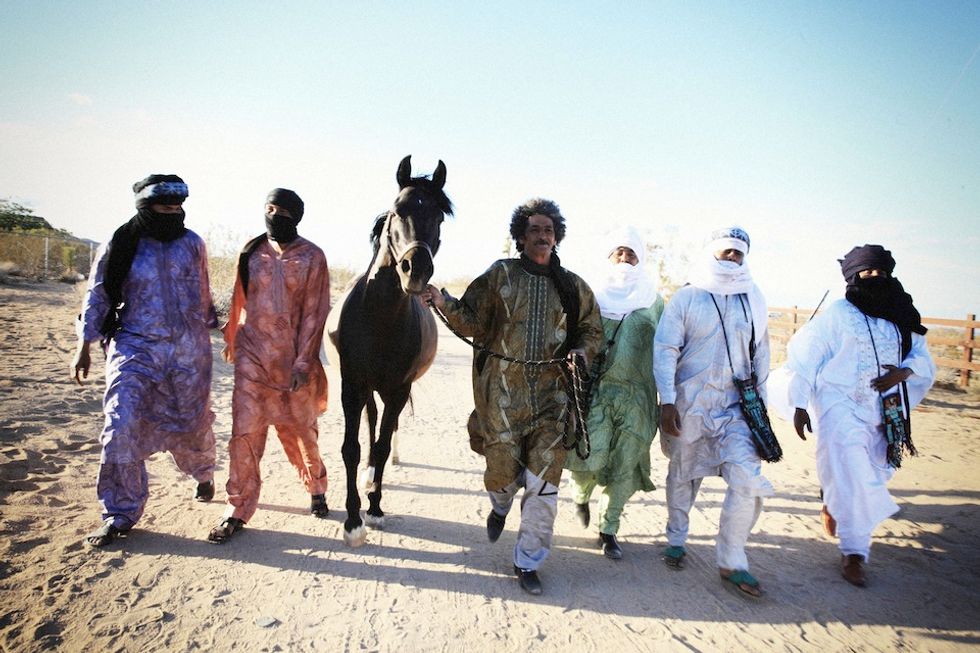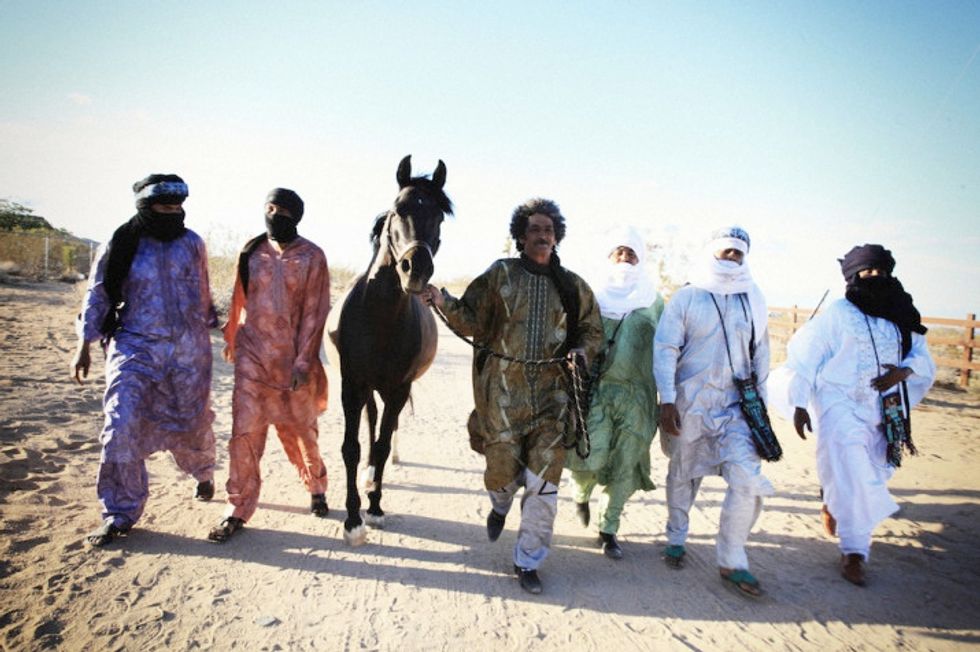Tinariwen On 'Emmaar'
Okayafrica caught up with Tinariwen in the lead-up to 'Emmaar,' one of their most comprehensive, contemplative and layered offerings yet.

In so many ways, Tinariwen’s music is the shifting desert that is their home—guitar melodies swirl like dust devils across the Sahara, a single lead note occasionally shines forth like a campfire glowing on the horizon, reverberant percussion lines and entrancing call-and-response vocals mirror the vastness of a desert night sky. The members of Tinarwen, part of an ethnic group of nomadic pastoralists from North Africa called the Tuareg (aka Kel Tamashek), know how vital the ground they stand on is to the music they create.
For this reason, their best material has been recorded at home in the desert. They recorded their first offering, Radio Tisdas Sessions, at a Tuareg radio station in a small commune in northern Mali called Kidal. They recorded their 2011 album, Tassili, in an outdoor, constantly moving studio in southeastern Algeria. So it is easy to imagine how difficult it was for the band to not be able to record their latest album Emmaar at home, due to the after-effects of an Islamist occupation that is still sending shockwaves through the region. It is easy to imagine the trepidation they must have felt to record in another desert, more than 6000 miles away, in Joshua Tree, California.
Maybe it was the national park’s storied history of creative inspiration, or perhaps the desert air reminded the band of home, but the relocation has done nothing to distort or dilute Tinariwen’s sound. If anything, the unrest at home—which among other tragedies, saw music outlawed for some time and a band member apprehended for trying to retrieve his guitars—has served as extra inspiration. Emmaar is one of Tinariwen’s most comprehensive, contemplative and layered offerings yet.
Like all of Tinariwen’s work, Emmaar is a piece that you can space out to and allow yourself to be transported. But it’s even more rewarding to zone in, focusing on a single part—the way a pinky is moved to add a glissando to a repeated guitar phrase or the subtleties of Said Ag Ayad’s calabash and djembe rhythms. These songs are not stationary or one-dimensional. Rather, they morph over time and over repeated listens.
If at first the album seems more restrained and laid back, it is because contemplative musical poems outnumber the up-tempo clap-alongs that Tinariwen is known for. But meditative tracks like the opener “Toumast Tincha,” the interlocked vocal and guitar melodies of “Arhegh Danagh” and the dancing-in-molasses groove of “Imidiwan Ahi Sigdim” contain the same intensity as the album’s faster tunes, like the galloping triplets of “Chaghaybou” and the straight-ahead rock of “Koud Edhaz Emin.” The spirit of this album exists in the spaces in between notes and the underlying tension of its quietness. The album is full of potential energy growing in whispers until releasing in brief explosive moments of wailing guitars and group vocals that, even in a foreign tongue, encapsulate the struggles of a displaced and ancient nomadic culture.
Emmaar, like its predecessor Tassili, contains a host of American collaborators. Poet and hip-hop artist Saul Williams opens the album in an ethereal baritone, the guitars of Chavez’s Matt Sweeney and Red Hot Chili Peppers’ Josh Klinghoffer swell in and out throughout the album, and Nashville fiddler Fats Kaplin sounds right at home in “Imdiwanin ahi Tifhamam.” Collaborations like this— one-off jams with a band that has been perfecting its craft for decades— can be dangerous. Countless acts have made the blunder of adding guests for the sake of star power. But Tinariwen has yet to fall into this crossover trap. Emmaar is still very much the sound of ancient Tuareg musical traditions being sent through a host of turned-up electric guitars.
During a break from a week of album promotion, vocalist/acoustic guitar player Abdallah Ag Alhousseyni talked to Okayafrica in his Midtown hotel room about recording far from home, the political situation in northern Mali and the uncertainty of future plans, all while noodling on a new Martin & Co. guitar.
(interview on page 2)


